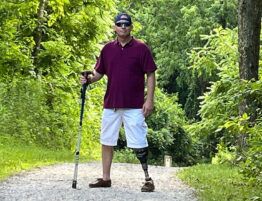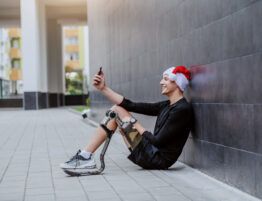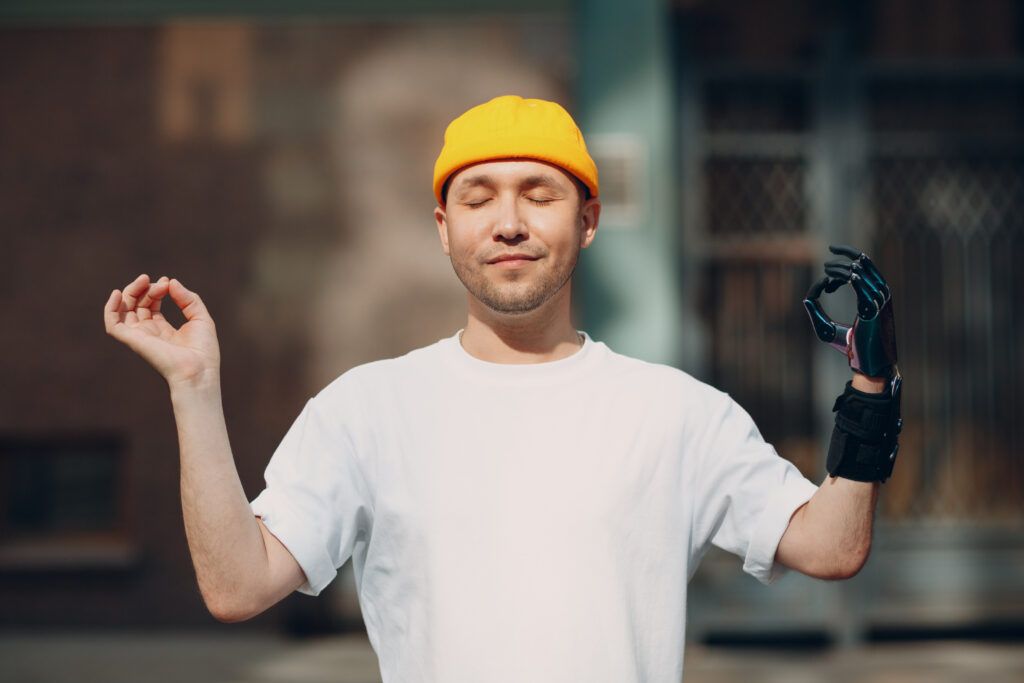 Being positive and happy all the time isn’t so easy. Not for most.
Being positive and happy all the time isn’t so easy. Not for most.
Let’s be Real. Prosthetic limbs don’t ‘fix’ everything for amputees and people with limb loss.
Whether you had a traumatic injury or disease resulting in an amputation, or you were born with limb difference – prosthetic legs, feet, arms, or hands don’t address less visible challenges you may be facing.
How are you feeling, emotionally?
Are you angry or depressed when you see others doing things with ease… because they can’t possibly relate?
Maybe you’re feeling isolated? Are you vacillating between gratitude and resentment when someone offers help? Do you feel paralyzed by fear or lacking self-esteem?
Note: If you are experiencing a mental health crisis (including suicidal feelings or thoughts of hurting someone else), contact a trained crisis counselor for confidential and immediate help now:
-
- Crisis Text Line: Text “HOME” to 741741
- 988 Suicide & Crisis Lifeline: Call 988
- SAMHSA’s National Helpline: Call 1-800-662-HELP (4357) or Text 435748 (HELP4U) for mental health and/or substance use treatment referrals and support group info
- National Alliance on Mental Illness (NAMI) Helpline: Call 1-800-950-NAMI (6264), Text 62640, Chat org/help, or Email helpline@nami.org
- Veterans Crisis Line: Call 988, option 1 or Text 838255
If you aren’t experiencing a mental health crisis but would like more resources or tools to help improve your mental well-being, you’ll find 10 categories with examples below. Some you may have tried, while others might not be on your radar at all. Our research yielded some interesting discoveries.
What we’re NOT delving into here is a list of mental health disorders, symptoms, and stages. For more information about those, please contact your primary care doctor.
This post might be helpful if you’re having thoughts like:
“I’m pretty concerned and need help but am not at risk of hurting myself or others.” Or …
“I’m struggling to feel better and not doing so great mentally. I should probably reconnect with people somehow.”
Feelings like that might be more common than you think. According to the Amputee Coalition, of the 2.1 million people living with limb loss in the U.S.A., 36% experience depression. Let’s do the math: that’s 756,000! And that # doesn’t include those dealing with anxiety, PTSD, etc.1
If you’re a caregiver, you might be having thoughts like:
“I need advice on how to be supportive with options beyond what I can do to help.” Or …
“I’m tired and am neglecting myself. I feel like I can’t keep up and might need a lifeline too.”
According to the Anxiety & Depression Association of America, 20% of family caregivers suffer from depression and 38% indicate the situation is extremely stressful.2
Again, let’s be real. Being positive and happy all the time isn’t so easy. Not for most.
Identifying the right fit is unique to every individual whether it’s prosthetic or mental health care you most need at this moment. While our expertise is prosthetic limbs, we’re committed to a holistic approach for our patients and their caregivers. That’s why we’re sharing mental health and well-being resources that extend beyond our scope of practice.
While some are specifically geared toward the amputee and limb difference community, many apply to everyone.
Parenthetically, you might be surprised to find non-traditional alternatives for better mental health in our list (e.g. art therapy, music therapy and horticultural therapy).
Wishing you good health and peace of mind! – Prosthetix Shop
Categories:
-
Amputee And Limb Loss Support Groups
-
Adaptive Sports
-
Mindfulness And Meditation
-
Mental Health Therapy / Counseling
-
Art Therapy
-
Amputee/Life Coach
-
Music Therapy
-
Gardening Therapy
-
Service Animals
-
Curiosity and Exploration
*No category is intended to represent “best in class” or a comprehensive listing. Prosthetix Shop isn’t paid for inclusions or omissions of any sort. Dear reader, please comment with tips from your own personal experiences.
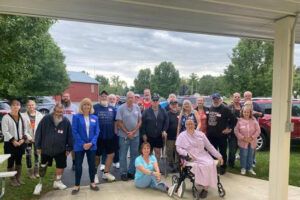
A.C.T.I.O.N. Amputee Support Group
1) Amputee And Limb Loss Support Groups:
Support groups provide great opportunities to connect with people who share a common denominator – relatable circumstances and/or experiences. The following local and national groups offer in-person and/or virtual meetings and typically meet once a month on a designated day and time:
- Cincinnati, OH (in-person): Tri-State Amputee Support Group *Contact: Lois at (513) 891-2442
- Northern KY (in-person): Gateway Rehabilitation Hospital *Contact: Deonna at (859) 426-2344
- Columbus, OH (in-person & online): Byonic Limb Loss Support Group *Contact: Tim at (614) 584-4945
- Troy, OH (in-person & online): A.C.T.I.O.N. Support Group ‘“ accepting national participants remotely. *Contact: Molly at (937) 339-1123
- National (online & in-person): Amputee Coalition Support Group Network and AC Connect (a NEW online community)
- National (online & in-person): Wounded Warrior Project Peer Support
- San Antonio, TX (in-person): San Antonio Amputee Foundation *Contact: Mona at (210) 269-6662
*If you’re wondering why we included SAAF (since it’s neither a national support group, nor is it near Prosthetix Shop’s locations), there is a reason! Founder, Mona Patel, recently spoke at the AOPA Conference where Prosthetix Shop’s Owners, Aaron Moles and Megan Albury, were in attendance. Her guiding philosophy resonates with us. One of Mona’s central messages is about living life in and with GRACE ‘“ Gratitude with Resilience and a kind Attitude in Community and Empathy.
Like many in the amputee and limb loss community, she has an amazing story! Mona is a trailblazing amputee leader and Top 10 CNN Hero of the Year Finalist who’s inspired so many. If you need a dose of inspiration, we highly recommend this short video featuring her journey (along with fellow amputees)’“ scaling Mount Kilimanjaro!: Cloud Walkers
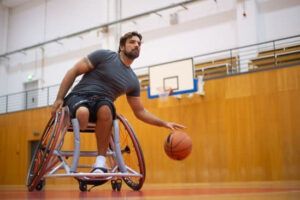 2) Adaptive Sports ‘“ Let’s Get Physical:
2) Adaptive Sports ‘“ Let’s Get Physical:
You’re likely familiar with the link between exercise and better health (from improved blood pressure and better diabetes management to reductions in depression and anxiety symptoms), but did you know how many adaptive sports and recreational opportunities exist for amputees and disabled individuals?
WOW ‘“ so many options! And you don’t have to be a paralympic athlete to get involved!
We hope you smile as you view the long list of what’s available today for various levels of participation. What a wonderful way to do what you love with people who share the same passion and similar access barriers.
Like what?
Soccer, dance/ballet, rock climbing, water skiing, mountain biking, basketball, swimming, tennis, sled hockey, softball, martial arts, fencing, downhill skiing, bowling, cycling, sailing, kayaking, horseback riding, yoga, pickleball, gaming and more. No joke! And here are some local organizations bridging participation gaps:
Cincinnati, OH and Northern, KY:
- The Bridge Adaptive Sports and Recreation
- Adapted Sport and Recreation“ Cincinnati Recreation Commission
- Cincinnati Ice Breakers Sled Hockey
- Cincinnati Dragons Wheelchair Basketball
Columbus, OH:
Online:
And let’s not forget the important role physical therapy plays in healing and guiding your progress toward independent mobility. If you aren’t already working with a PT, we can make a recommendation based on your needs and location. *Sign up for our newsletter to receive notifications for more information in future posts.
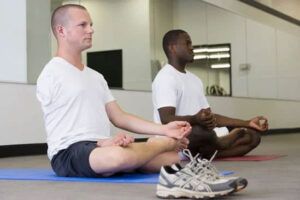 3) Mindfulness And Meditation:
3) Mindfulness And Meditation:
Do you ever feel like your brain was hijacked by a constant stream of thoughts about the past or future – fears and concerns about “should have” and “what if”? According to a Harvard Study, “people spend 46.9% of their waking hours thinking about something other than what they’re doing.”3
If you’re looking for a way to control the narrative in your head, relax, be more present and improve your overall well-being, there’s good news. Research shows correlations between mindfulness, meditation and positive impacts on both the mind and body including: reduction in stress, anxiety, depression, chronic pain symptoms and blood pressure, as well as improved sleep.4
Let’s establish though – there is a difference between mindfulness and meditation…. and mindfulness meditation. In short, “Mindfulness is a quality; meditation is a practice.”5 Mindfulness meditation is a popular type of meditation.
Check out Positive Psychology’s article Mindfulness Meditation: 22+ Best Videos & Scripts (+PDF) for more definitions, benefits, techniques, and resources.
If you’re looking for apps or online tools, consider one of these:
- Headspace (free trial)
- Calm (free trial)
- Harvard University Center for Wellness and Health Promotion (Guided Meditations) (free)
*Many more options are available, and your unique goals will help you determine the best fit for you. Categories include: Mindfulness, Relaxation, Breathing, Sleep Guides, Soundscapes, Meditation, Anger/Sadness/Growth, Stress Management, Creativity and Mindful Eating.
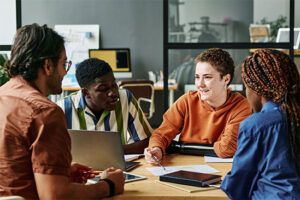 4) Mental Health Therapy / Counselling:
4) Mental Health Therapy / Counselling:
If you’ve already tried it or think this isn’t for you, scroll down to other non-traditional mental health suggestions. Otherwise, the best place to start for individual counselling or therapy is a referral through your primary care doctor. She/he can recommend a licensed professional based on your medical history, insurance coverage and goals. Although we recommend referrals from healthcare providers you trust, online directories include:
You can search with filters by location (or virtual) and personal preferences, as well as therapy service type (e.g. Mindfulness-Based Cognitive Therapy) or experience with a specific mental health condition.
*Call your insurance company for coverage and benefit information. For mental health prescription medication, consult your primary care doctor for a referral to a licensed psychiatrist.
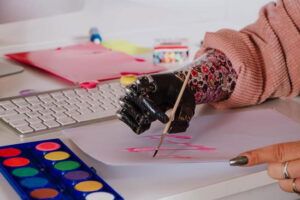 5) Art Therapy:
5) Art Therapy:
What is art therapy? That depends on who you ask and whom you consult. According to the American Art Therapy Association, it’s a mental health profession that combines the application of psychological theory and creative art-making. Reviews are good, and you don’t have to be an artist to do this!
Art therapy is considered an effective tool to professionally facilitate treatment goals to improve mental health, self-esteem, self-awareness, emotional resilience, and conflict resolution skills; while reducing stress.6
Cincinnati: The Art of Therapy You’re tired of pasting a fake smile on your face and pretending that everything is great when people ask, ‘How’s it going?’ If you answered yes, Laura might be able to help you.
- “find a safe place to get the thoughts and worries out of your head” and,
- “get you some relief.”
Credentialed in both talk therapy and art therapy, she also has experience working with disabled individuals with limited mobility. *Call Laura at (513) 463-6339.
Columbus: Columbus Art Therapy “If you feel like no one understands you or the pain you’re going through.. I’ll be here with you through the whole process, wherever the journey takes you. Art therapy works with the brain differently than talk therapy does so that part of your brain that feels blocked or foggy due to trauma, starts to hook back up with the parts of your logical brain that are your verbal centres.” Maggi offers in-person and virtual sessions and has experience working with amputees. *Call Maggi at (614) 800-9508.
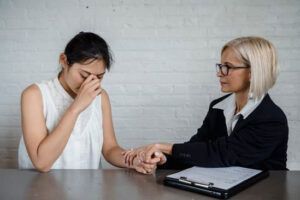 6) Amputee/Life Coach:
6) Amputee/Life Coach:
Life Coaches offer services ranging from goal setting and accountability programs to mindfulness techniques – to help you advance, overcome obstacles, identify strengths/weaknesses, and achieve your objectives through intentional design.
If you Google “Life Coach near me”, you’ll likely find plenty of choices. Be sure to check the reviews.
We happened upon Kevin Kappler, PhD, who’s known as “Dr. Kevin” and offers virtual Amputee Coaching services. An amputee himself, his experience also includes serving as a clinical psychologist for 30 years and working with amputee vets at the VA in San Francisco. He specializes in treating panic disorders and post-traumatic stress and offers a free initial consultation. You can reach him directly at (209) 768-8689 or drkevin@amputee.coach.
*Prosthetix Shop has no direct experience with “Dr. Kevin.” Other Life Coaches may or may not be a better fit for you.
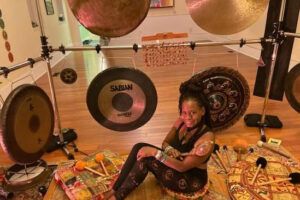
Tisa, SoulShine Warrior (Cincinnati, Ohio)
7) Music Therapy:
Music therapy may include creating or singing music, listening or moving to music, and/or discussing music and lyrics.
According to the Cleveland Clinic, music therapy can lower your blood pressure, reduce pain and stress levels, decrease depression and anxiety, improve motor processing and sleep, and lessen feelings of isolation.7
While we have no first-hand experience, these instructors and therapists are locally based:
- Cincinnati: Music Therapy Services of Cincinnati and Soul Shine Warrior Sound Baths (Be sure to watch the videos, from India to Miami University in Oxford, Ohio)
- Columbus: Dynamic Music Therapy Services
If interested in this kind of therapy and researching on your own, consider searching for ‘Sound Healing’ or ‘Sound Therapy’ as well.
 8) Gardening Therapy:
8) Gardening Therapy:
At Prosthetix Shop, we strive to connect with the world in meaningful ways. On point, this news segment caught our attention. Ah yes! Plants. Dirt. Water. Reconfiguration. Rejuvenation. Life!
Check out the TODAY show’s The Upside: Healing Through Gardening, featuring Barbara Lawson”s Mobile Gardening Therapy service called Meet Me in the Dirt. Counseling and building her own healing garden to cope with the grief of losing her mother (a double-amputee) led to restored hope and healing, and ultimately this transformational journey inspired Barbara to combine her psychology, social work and grief counseling education into a healing gardening therapy business to help others. While Barbara is based in California, we had the privilege of speaking with her directly and learned she does offer virtual sessions. You can contact her at (888) 400-0733.
For those in Cincinnati “ check out the classes/workshops (some free) on gardening via Civic Garden Center of Greater Cincinnati! We really did NOT know all that’s offered!
And in Columbus, Ohio ” the Chadwick Arboretum & Learning Gardens – Horticultural Therapy Garden was designed for disability accessibility and ” to improve social, educational, psychological, and physical adjustments of persons, thus improving their body, mind and spirit.”
 9) Service Animals:
9) Service Animals:
“Animals are such agreeable friends – they ask no questions; they pass no criticisms.” – George Eliot
Need we say more? For those of you who are animal lovers, you get it. For those who aren’t but are considering a service animal for yourself or someone you care for, we encourage a deeper dive.
As defined by the ADA (Americans with Disabilities Act), service animals are “trained to do work or perform tasks for the benefit of an individual with a disability.” They can help with everyday activities like retrieving something, turning lights on and off, bracing for transfers, etc. Not to mention the emotional support they provide.8
There are so many positive outcome stories, it would be hard to pick one to share. If you search for “amputee service animal”, Google and YouTube are full of heart-warming videos and articles.
Be sure to research all the pros and cons though. Aside from all the benefits, you should know what else is involved (e.g. animal care, funding sources, costs you’d absorb yourself, training time, and other risks).
To inquire if it’s right for you or yours:
- 4 Paws for Ability *Based in Xenia, Ohio
- Canine Companions *National with chapters in Cincinnati and Columbus, Ohio
*Contact the ADA at 800-514-0301 or click here for ADA Service Animal Requirements information.
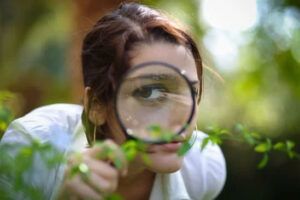 10) Curiosity and Exploration:
10) Curiosity and Exploration:
“Research has shown curiosity is associated with higher levels of positive emotions, lower levels of anxiety, more satisfaction with life, and greater psychological well-being.”
Are you curious?
If so, good for you! But let’s face it – sometimes we’re too tired to be curious. Reality is real. However, when you do have a little energy and time (doesn’t have to be a lot, because you can go at your own pace), think about what interests you. What do you want to learn but need access to?
Opportunities are out there when you’re ready.
Universities have non-credit auditing, experiential learning & personal exploration classes at reduced fees. Local organizations offer free programs.
And the online universe has a plethora of event-based experiences (some free), as well as fee-based courses for educational and personal enrichment purposes. One example is:
MasterClass They claim you can gain new skills in 10 minutes and have 180+ classes. If you’re into hearing what well-known experts, legends and famous people have to say about your favorite topic… you might want to have a look. *2-for-1 deals are sometimes offered.
Topic Examples: Comedy, Writing, Filmmaking, Sports, Poker, Wellness, Interior Design, Wilderness Survival, Gardening, Cooking, Beauty, Sleep, Dog Training, FBI Profiling & Space Exploration!
And if you’re able and financially capable of traveling .. there’s a big world out there to explore with nearly 8 billion people and an infinite number of mind-shifting experiences. *Sign up for our newsletter to receive notifications for more information (including Tips for Accessible Travel) in future posts.
In Conclusion:
Back to our opening statement: Let’s be Real. Some things are easier said than done. And yet, this quote hits home for us:
“Even the smallest shift in perspective can bring about the greatest healing.” – Joshua Kai
About Prosthetix Shop:
Prosthetix Shop delivers expert, licensed and state-of-the-art prosthetic care to amputees in Cincinnati, Northern Kentucky, Urbancrest and Columbus, OH.
With 20 years of experience, we know that fitting and adjusting prosthetic legs and prosthetic arms is more than just a functional service. Our holistic process involves listening to your unique needs and objectives, thoroughly assessing your mobility opportunities, and promoting a healthy mindset to achieve your goals (big or small).
We’re here to help you regain control over your world. Finding the right prosthetist can be life changing. You’d be hard pressed to find two prosthetists like Aaron Moles and Megan Albury who care more and will work harder for you. Call now for a free consult!
Call or text (513) 843-5126, or email info@prosthetixshop.com.
Sources:
1 —. “Amputee Coalition Research Article Published in Notable Orthopedics Journal.” THRIVE – Amputee Coalition Blog, 6 Feb. 2022, blog.amputee-coalition.org/home-feature-right/amputee-coalition-research-article-published-in-notable-orthopedics-journal. Accessed 20 Feb. 2023
2 Anxiety & Depression Association of America. “Caregiver Mental Health | Anxiety and Depression.” ADAA, 25 Jan. 2023, adaa.org/find-help/by-demographics/caregivers. Accessed 20 Feb. 2023.
3 Bradt, Steve. “Wandering Mind Not a Happy Mind.” Harvard Gazette, 2 May 2019, harvard.edu/gazette/story/2010/11/wandering-mind-not-a-happy-mind. Accessed 20 Feb. 2023.
4 Thorpe, Matthew, MD PhD. “12 Science-Based Benefits of Meditation.” Healthline, 27 Oct. 2020, healthline.com/nutrition/12-benefits-of-meditation. Accessed 20 Feb. 2023.
5 Schultz, Joshua Psy. D. “5 Differences Between Mindfulness and Meditation.” PositivePsychology.com, 12 Sept. 2022, positivepsychology.com/differences-between-mindfulness-meditation. Accessed 20 Feb. 2023.
6 “About Art Therapy.” American Art Therapy Association, 18 Jan. 2023, arttherapy.org/about-art-therapy. Accessed 20 Feb. 2023.
7 “Music Therapy: What Is It, Types and Treatment.” Cleveland Clinic, my.clevelandclinic.org/health/treatments/8817-music-therapy. Accessed 20 Feb. 2023.
8 “Service Animals.” Amputee Coalition, 4 Oct. 2022, amputee-coalition.org/resources/service-animals. Accessed 20 Feb. 2023.
9 Campbell, Emily. “Six Surprising Benefits of Curiosity.” greatergood.berkeley.edu/article/item/six_surprising_benefits_of_curiosity. Accessed 20 Feb. 2023.
#amputee #amputeelife #amputeestrong #prostheticleg #prostheticarm #loveyourself #prosthetics #adaptivesports #cincinnatidragons #wheelchairbasketball #cincinnatiicebreakers #cincinnatiadaptivesports #caregivers #caregiversupport #disabilityinclusion #disabilitysupport #servicedog #4pawsforability #limbdifferenceawareness #lowerlimbloss #upperlimbloss #mentalhealthawareness #weTHRIVE #livingmybestlife #doglovers #noamputeealone #amputeecoalition #paralympics #inclusionmatters #limbdifference #representationmatters #perspective #adaptive #selfcare #mentalhealthmatters #mentalhealth #anxiety #depression #wellbeing #amputeecoalition

